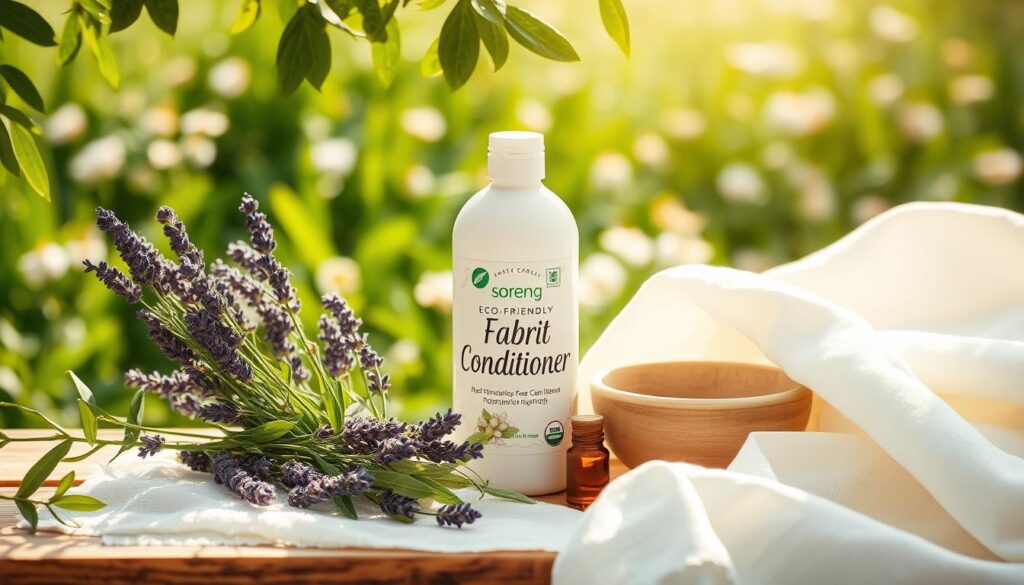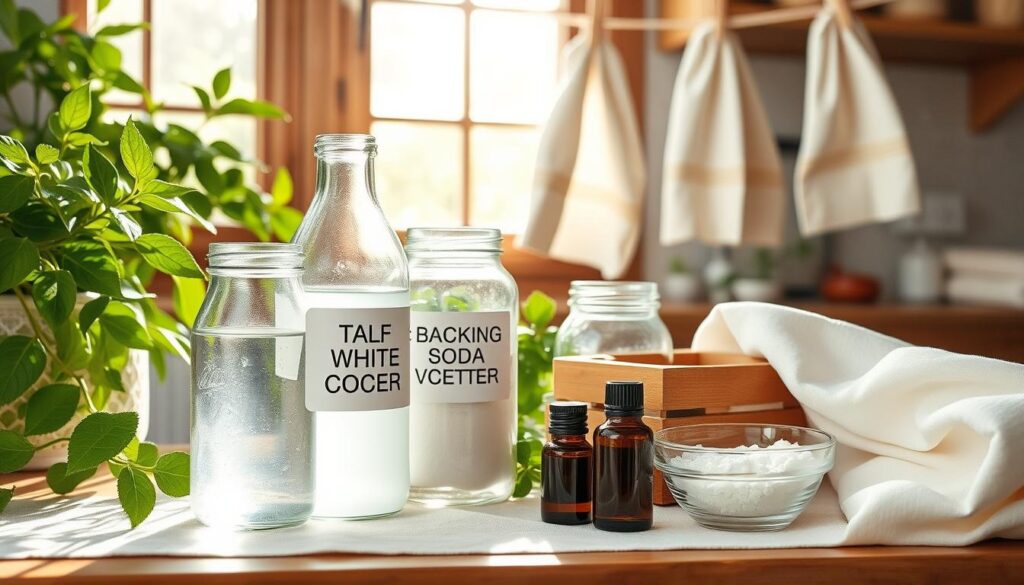In today’s world, people are looking for eco-friendly options for their daily needs. This includes their laundry routines.
Eco-friendly fabric softeners are becoming popular as a way to keep clothes fresh and soft without chemicals.
Regular fabric softeners have many synthetic chemicals and fragrances. These can be tough on skin and the environment. But, there’s a growing need for sustainable laundry products.
This has led to the creation of eco-friendly fabric softeners that are gentler and more natural.
In an age where sustainability and health consciousness are becoming increasingly important, many people are seeking alternatives to conventional laundry products that can contain harsh chemicals. Traditional fabric softeners, while they certainly leave clothes feeling soft and smelling great, often contain synthetic fragrances and compounds that can be irritating to the skin and harmful to the environment. Fortunately, there are eco-friendly fabric softeners that can achieve the same results without compromising your health or our planet.
Table of Contents

Why Choose Eco-Friendly Fabric Softeners?
- Better for Your Health: Many conventional fabric softeners contain a long list of chemicals, including quaternary ammonium compounds, synthetic fragrances, and preservatives. These substances can irritate the skin and respiratory system. Eco-friendly alternatives often use plant-based ingredients and essential oils, reducing potential allergic reactions and sensitivities.
- Planet-Friendly: The production and disposal of chemical fabric softeners contribute to environmental pollution. Eco-friendly options, often labeled as biodegradable or sustainably sourced, minimize environmental impact and help you feel good about your laundry choices.
- Gentle on Fabrics: Eco-friendly fabric softeners can be just as effective at softening clothes as their chemical counterparts. They work by coating fibers with natural oils, which can help reduce static and prevent wear and tear, extending the life of your garments.
Natural Ingredients for Fabric Softening
If you want to try making your own eco-friendly fabric softener at home, there are several simple ingredients you can use:
- Vinegar: White distilled vinegar is a fantastic natural softener. Just add 1/2 to 1 cup to the rinse cycle of your laundry. It helps to dissolve detergent residues and softens fabrics without leaving any scent behind.
- Baking Soda: This common household ingredient can be combined with vinegar to enhance its effectiveness. Baking soda helps to remove odors and soften fabrics naturally.
- Essential Oils: For those who enjoy a pleasant scent, adding a few drops of essential oils like lavender, eucalyptus, or lemon to your vinegar or baking soda solution can impart a lovely fragrance to your laundry without synthetic chemicals.
- Flaxseed Gel: This innovative option can be made by boiling flaxseeds in water and straining the mixture. The resulting gel can be used as a natural fabric softener. Just dilute with water and use it in the rinse cycle.
How to Use Eco-Friendly Fabric Softeners
- Vinegar Method: Add 1/2 cup of white vinegar directly to the fabric softener dispenser in your washing machine. If your machine doesn’t have a dispenser, add it during the rinse cycle.
- Baking Soda Solution: Mix 1/2 cup of baking soda with a few drops of essential oil and add it to your laundry during the rinse cycle.
- Flaxseed Gel: Dilute 1/4 cup of flaxseed gel with 3/4 cup of water and add it to the fabric softener dispenser.
Tips for Extra Softness
- Drying Techniques: Using dryer balls made from wool or rubber can help to separate clothes in the dryer, allowing hot air to circulate better. This can lead to softer clothes while reducing drying time.
- Proper Drying: Over-drying can actually make clothes feel stiff. Aim to remove clothes from the dryer while they’re still slightly damp and let them air dry to finish.
- Washing Tips: Washing clothes in warm water (when appropriate) can also help in maintaining softness while ensuring that fabrics are effectively cleaned.
Tips for Sustainable Fabric Care
- Choose Natural Fibers: Start with the right materials. Opt for fabrics made from natural fibers such as organic cotton, linen, hemp, and Tencel. These materials are not only biodegradable but often require less chemical processing than synthetic fabrics.
- Wash with Care: Reduce your laundry frequency by wearing clothes multiple times before washing them, especially items like jeans and sweaters. When you do wash, use cold water and a gentle cycle to reduce energy consumption and extend the life of your garments.
- Eco-Friendly Detergents: Invest in biodegradable and non-toxic laundry detergents. Many brands now offer eco-friendly options free from harmful phosphates and synthetic fragrances, making them a safer choice for both the environment and your skin.
- Air Dry: Whenever possible, skip the dryer and hang your clothes to air dry. This saves significant energy and reduces wear and tear on your fabrics. Plus, line drying can help eliminate static cling and ensure brighter colors.
- Spot Clean Instead of Full Washes: For minor stains, try spot cleaning with natural solutions such as vinegar or baking soda instead of washing the entire garment. This conserves water and extends the life of your clothes.
- Proper Storage: Store your clothes correctly to prevent damage. Use breathable garment bags for delicate items and avoid overcrowding your closet. This helps maintain the shape and integrity of your fabrics.
- Repurpose and Upcycle: Get creative with worn garments. Instead of discarding them, consider repurposing or upcycling them into new items, such as tote bags, cleaning rags, or even patchwork projects.
- Mindful Disposal: When it’s time to part with clothes, don’t throw them away. Donate, sell, or recycle garments to extend their lifecycle. Many organizations and retailers have programs that ensure textiles are disposed of responsibly.
Benefits of Eco-Friendly Fabric Care
Adopting eco-friendly fabric care has numerous benefits, not just for the environment but also for your personal well-being and finances:
- Environmental Impact: Reducing chemical usage and energy consumption helps protect waterways, air quality, and the overall health of our planet. Sustainable practices contribute to the fight against climate change by lowering carbon emissions.
- Cost Savings: By investing in quality, natural fabrics and reducing laundry frequency, you can save money on detergent, energy, and replacement clothing.
- Healthy Living: Eco-friendly products often contain fewer allergens and irritants, making them a better choice for sensitive skin and improving indoor air quality.
- Longer Lasting Wardrobe: Sustainably caring for your clothes can significantly extend their lifespan, reducing the need for frequent replacements and ultimately leading to less waste.
Impact of Traditional Fabric Softeners:
Traditional fabric softeners contain many chemicals. These include fragrances, optical brighteners, and quaternary ammonium compounds. These can cause skin irritation and breathing problems, especially for those with sensitivities.
The production and disposal of these green laundry products also harm the environment. Switching to sustainable laundry solutions and non-toxic fabric care is better for us and the planet. Looking into environmentally conscious fabric softeners and organic fabric softener options lets us keep our clothes soft and fresh while living an eco-friendly lifestyle.
top 10 eco friendly fabric softeners:
- Seventh Generation: Founded in 1988, Seventh Generation is known for its eco-friendly household and personal care products. The brand focuses on sustainability, using plant-based ingredients and recyclable packaging. Their product range includes laundry detergents, dish soaps, and cleaning supplies.
- Ecover: Ecover is a Belgian company specializing in environmentally friendly cleaning products. Established in 1980, the brand uses natural plant and mineral ingredients, and their products are biodegradable and made in factories powered by renewable energy. They offer a variety of cleaning solutions, including laundry detergents and surface cleaners.
- Attitude: Known for its commitment to health and sustainability, Attitude offers a range of biodegradable and eco-friendly products. Founded in 2005 in Canada, the brand provides personal care, cleaning, and baby products that are made with natural ingredients and are free of harmful chemicals.
- Mrs. Meyer’s Clean Day: This American brand was launched in 2001 and is recognized for its aromatic cleaning products. Mrs. Meyer’s utilizes essential oils and plant-derived ingredients in their formulas. Their range includes all-purpose cleaners, hand soaps, and laundry products, often noted for their pleasant and garden-inspired scents.
- Method: Method is a company that creates non-toxic household cleaning products with a focus on design and functionality. Founded in 2000 in California, the brand emphasizes sustainability, using biodegradable ingredients and recyclable packaging. Their products range from laundry detergents to surface cleaners with unique fragrances and modern designs.
- Biokleen: Established in 1989, Biokleen offers a variety of eco-friendly cleaning products for the home. The brand emphasizes using natural ingredients without harmful chemicals, focusing on effective cleaning solutions that are safe for human health and the environment. Their product line includes laundry detergents, all-purpose cleaners, and stain removers.
- Fabric Softener by Ecos: Part of the Ecos brand, known for its environmentally friendly cleaning products, this fabric softener is made with plant-based ingredients and is biodegradable. Ecos focuses on sustainability, offering various laundry products that are gentle on fabrics while being safe for the planet.
- The Laundress: Founded in 2004, The Laundress is a premium brand known for its high-quality laundering and fabric care products. They offer specialized detergents for various fabrics and clothing types, as well as stain removers and fabric fresheners. The brand emphasizes luxury and effectiveness, with eco-friendly formulations.
- Purex Natural Elements: Part of the Purex brand, Purex Natural Elements focuses on providing laundry detergents made with natural ingredients. These products are designed to be effective while being gentle on clothes and the environment. Their offerings often include pleasant scents derived from botanical extracts.
- Charlie’s Soap: Established in the 1970s, Charlie’s Soap is known for its all-natural laundry detergent made from biodegradable ingredients. The brand emphasizes cleaning power without the use of harmful chemicals or fragrances, making it suitable for sensitive skin and environmentally conscious consumers.
Natural Alternatives to Fabric Softeners
More people want to be kind to the planet, so they’re looking for eco friendly fabric conditioner options. These biodegradable softening agents are made from plants. They keep your clothes soft and fresh, without the bad stuff in regular fabric softeners.
Organic fabric softener is a big hit. It’s made from things like essential oils, vinegar, and baking soda. These plant-based softener options are good for you and your clothes. They keep colors bright and fabrics in great shape.
- Vinegar-based fabric softeners: These use acetic acid to soften clothes gently. They’re a great eco friendly fabric conditioner choice.
- Essential oil-infused softeners: These mix plant-based softeners with essential oils. They make your clothes smell nice and fresh.
- Baking soda and castile soap blends: These are simple but work well. They soften clothes and keep their natural pH balance.
Choosing these natural options means you can have soft, fresh clothes. And you’re helping the planet and animals too.

Preserving Fabric Quality and Color Vibrancy
Using environmentally conscious fabric softeners helps keep your clothes looking great. They don’t leave a waxy residue like some chemical softeners do. This means your clothes stay soft and colorful for longer.
| Eco-Friendly Fabric Softeners | Traditional Fabric Softeners |
|---|---|
| Plant-based, natural ingredients | Synthetic chemicals |
| Gentle on skin and environment | Potential skin irritants |
| Preserves fabric quality and color | Can cause fabric damage and dullness |
Switching to eco-friendly fabric softeners is a smart choice. You get soft, fresh clothes and help the planet. There are many natural fabric conditioners out there, making it easy to go green without losing quality.

Eco-Friendly Fabric Softener Recipes
Are you tired of harsh, chemical-laden fabric softeners? They can harm the environment and your family’s health. Creating your own eco-friendly fabric softener at home is simple and cost-effective. We’ll look at vinegar and essential oil solutions, as well as plant-based fabric conditioners.
Vinegar and Essential Oil Solutions
White vinegar is a versatile and effective eco-friendly fabric softener. Mix 1 cup of white vinegar with 10-15 drops of your favorite essential oils. You can use lavender, lemon, or eucalyptus. The vinegar softens fabrics, while the essential oils add a fresh scent.
Just add this mixture to your rinse cycle. Enjoy soft, fragrant clothes without harsh chemicals.
Plant-Based Fabric Conditioners
Try creating your own plant-based fabric conditioner. Mix 1 cup of baking soda, 1 cup of arrowroot powder, and 10-15 drops of essential oils. This blend softens clothes, removes static, and smells great.
You can customize the scent by trying different essential oil combinations.
Using eco-friendly fabric softener recipes is a simple way to reduce your environmental impact. You can enjoy fresh, soft fabrics without harsh chemicals found in traditional fabric softeners.

| Ingredient | Quantity | Purpose |
|---|---|---|
| White Vinegar | 1 cup | Fabric softener |
| Essential Oils | 10-15 drops | Natural fragrance |
| Baking Soda | 1 cup | Biodegradable softening agent |
| Arrowroot Powder | 1 cup | Biodegradable softening agent |
FAQ
What are eco-friendly fabric softeners, and how do they differ from traditional fabric softeners?
Eco-friendly fabric softeners use natural ingredients to soften clothes. They don’t have harsh chemicals found in traditional softeners. These natural products are better for the environment and your clothes.
Why should I consider switching to eco-friendly fabric softeners?
Switching to eco-friendly fabric softeners is good for you and the planet. They are gentle on skin and the environment. They also keep your clothes looking new for longer. Plus, they’re made from plants and break down easily.
What are some common natural ingredients found in eco-friendly fabric softeners?
Eco-friendly softeners often have ingredients like vegetable oils and essential oils. You might find vinegar, baking soda, and coconut oil too. These natural ingredients soften clothes without harsh chemicals.
Can I make my own eco-friendly fabric softener at home?
Yes, making your own eco-friendly fabric softener is easy. You can mix vinegar with essential oils or use plant-based conditioners. It’s a way to save money and choose what goes on your clothes.
What are some reputable eco-friendly fabric softener brands to consider?
Brands like Mrs. Meyer’s, Method, Seventh Generation, and Dr. Bronner’s are known for being eco-friendly. They use natural ingredients and focus on sustainability. They have scented and unscented options for everyone.
Share this content:

